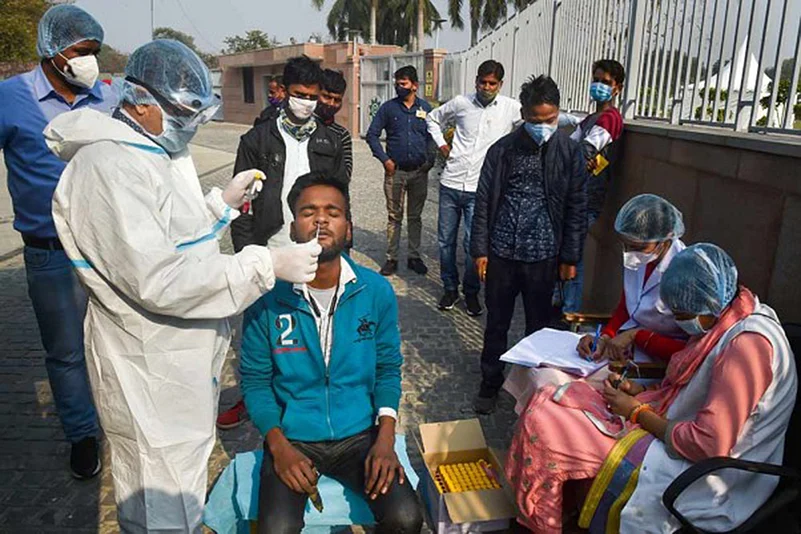As the country eagerly waits for a coronavirus vaccination drive in January, at least 500 intended beneficiaries in four states who had registered on the Co-WIN App were on Monday sent messages informing them about the time and place of their 'Covid-19 vaccination' appointment under a mock-drill to administer the shots at designated centres.
The two-day end-to-end dry run is being carried out in Krishna district in Andhra Pradesh, in Rajkot and Gandhinagar in Gujarat, Ludhiana and Shaheed Bhagat Singh Nagar (Nawanshahr) in Punjab and Sonitpur and Nalbari districts in Assam.
It is being conducted to test the mechanisms in place for conducting a Covid-19 vaccination programme and to provide insights into any gaps to be addressed before the commencement of the actual vaccination drive, officials said.
They said the exercise will test the functionality of Co-WIN, which is an online platform for monitoring the delivery of Covid-19 vaccine, deployment of team members, checking cold storage, transportation arrangements and other arrangements while following all necessary protocols.
Krishna district Collector A Md Imtiyaz, who inaugurated the dry run at the urban primary health centre at Prakash Nagar in Vijayawada, said "the (dummy) vaccine was transported from the central storage facility to cold chain points at various places".
The dry run was being carried out in five locations with 25 test beneficiaries (healthcare workers) for each session.
"We have recorded this in the Co-WIN App and sent SMSes to the chosen patients. We have monitored the time taken for different processes and the logistics involved. This will be used in real-time simulation," the Collector told reporters.
As per the checklist shared with the states by the Union Ministry of Health and Family Welfare, beneficiaries will be preidentified and an SMS will be sent to them in advance with the name of the vaccinator and the time of immunization. After the vaccination, they will be under observation for the next 30 minutes to address any adverse events.
A report on the dry run listing the issues involved is to be submitted by the states to the Union Ministry of Health and Family Welfare besides the State Task Force for necessary action.
Gujarat Immunisation Officer Dr Nayan Jani told reporters that local health officials of the chosen districts and cities engaged in administrative preparations on the first day of the drive. Gandhinagar Municipal Corporation (GMC) has identified 125 beneficiaries in the city who will be covered during the mock drill, said GMC Health Officer Dr Kalpesh Goswami. He said a total of 50 health personnel will visit the identified beneficiaries at five different sites in the city.
Punjab Health Minister Balbir Singh Sidhu said immunisation partners the UNDP and the WHO at the state-level were supporting the dry run. In Ludhiana, seven centres have been set up at various hospitals. All beneficiaries are required to be compulsory pre-registered on the CoWIN portal and a Photo ID will be required for the same.
Health officials in Ludhiana and Nawanshahr said for each centre 25 persons of those registered online were selected for the dry run.
District Immunisation Officer, Nawanshahr, Dr Davinder Dhanda said that necessary infrastructure at each centre includes a waiting area, an injection room, and an observation room where the person undergoing 'dummy vaccination' on Tuesday during the dry run would be kept for half an hour has been prepared.
Prior to the dry run, a special training workshop of personnel was also held.
Sidhu said that details of 1.5 lakh healthcare workers from private and public facilities have already been uploaded on the COWIN portal.
Assam officials said five hospitals in Nalbari and Sonitpur districts have been chosen for the exercise.
The state surveillance medical officer of the World Health Organisation (WHO) on Monday visited Nalbari district and held discussions on the exercise with health department officials and the Deputy Commissioner Purabi Konwar.
The Centre had asked each of the four states to plan the dry run in two districts and preferably in five different session-type settings -- district hospital, community health centre (CHC) or primary health care centre (PHC), urban site, private health facility and rural outreach.
An important focus of the dry run will be on management of any possible adverse events following immunisation (AEFI) as well as on adherence and management of infection control practices at the session site to prevent disease transmission, officials said.
The mock drill will include concurrent monitoring and review at block and district levels, and preparation of feedback to be shared with the state and the Centre.
"The central government is gearing up for the rollout of Covid-19 vaccines across the country. As the vaccine administrators will play an important role in the immunisation process, training of trainers and those who shall administer the vaccine has been taken up across various states," the health ministry had said, while announcing the mock drill.
To strengthen the human resource for the vaccine introduction and roll-out, detailed training modules have been developed for different categories of vaccine handlers and administrators, including medical officers, vaccinators cold chain handlers, ASHA coordinators and all others involved in the implementation process at different levels. To facilitate redressal of queries on Covid-19 vaccination and Co-WIN portal, national and state helpline capacity has also been strengthened, officials said.
The National Expert Group on Vaccine Administration of COVID-19 (NEGVAC) has recommended three prioritised population groups including, healthcare workers (about 1 crore), frontline workers (about 2 crore), and prioritized age group (about 27 crore).
As vaccines are temperature-sensitive, the present cold chain system consisting of 85,634 equipment for storage of vaccine at about 28,947 cold chain points across the country will be used, the ministry stated.
The current cold chain is capable of storing an additional quantity of Covid-19 vaccine required for the first three crore prioritised population.
















